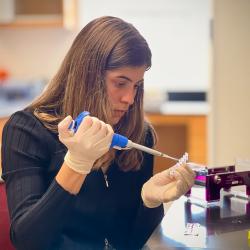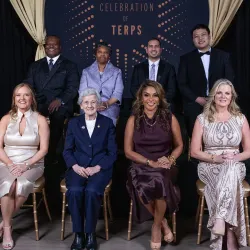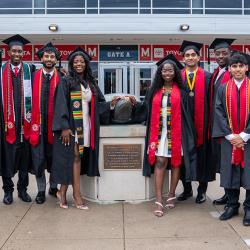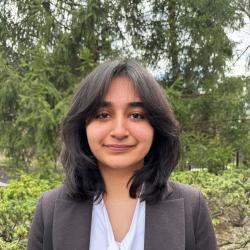UMD Biological Sciences Senior Elfadil Osman Named 2017 Gates Cambridge Scholar
Osman is second student in university history to be awarded this scholarship
University of Maryland senior Elfadil Osman has been named a 2017 Gates Cambridge Scholar. The Gates Cambridge Scholarship, which allows students outside of the United Kingdom to pursue graduate study at the University of Cambridge, is considered one of the most prestigious academic awards available to college graduates. Osman is the university’s second Gates Cambridge Scholar, following in the footsteps of Krzysztof Franaszek (B.S. ’13, biological sciences; B.A. ’13, economics).
“Elfadil is a remarkable young man,” said Norma Allewell, professor emerita in the UMD Department of Cell Biology and Molecular Genetics. “He is equally passionate about biomedical research and contributing to society, and he has a compelling personal vision of how he can meld the two.”
Osman—who is majoring in biological sciences with a specialization in physiology and neurobiology, and minoring in creative writing—plans to use the scholarship toward a Ph.D. in biochemistry at the University of Cambridge. His long-term plans include pursuing an academic career studying infectious diseases.
“My passion for science developed late because I wanted to make a difference in the Islamic world in which I grew up and I thought that studying law was a far better bet,” said Osman, who is Sudanese and emigrated with his family from Saudi Arabia to the United States at five years old. “My future path changed in 12th grade while working on an independent research project. My mentor, Dr. A. Kwame Nyame, a professor at the University of Maryland, Eastern Shore, showed me that science could be used as a tool to fight injustice—a tool that could mitigate or perhaps even eradicate an infectious disease whose burdens fall heaviest on those with the least resources.”
The infectious disease Osman wishes to eradicate is malaria. Growing up, he witnessed the destructive impact malaria had on his own family and others in nearby villages in northern Sudan. Today, he pursues research projects that allow him to gain a better understanding of malaria and Plasmodium, the parasite that causes malaria.
Osman spent the past two summers studying Plasmodium gene expression in the laboratory of Joseph DeRisi, professor of biochemistry and biophysics at the University of California, San Francisco, School of Medicine. This research, which was funded by the Howard Hughes Medical Institute Exceptional Research Opportunities Program (EXROP), led to a poster presentation by Osman at the Annual Biomedical Research Conference for Minority Students last November.
"I was thrilled to have Elfadil in my laboratory working on malaria," said DeRisi. "His own family members had suffered from malaria in Sudan and thus he knew only too well the devastating toll this parasite can take. Throughout his time in my lab, he was intensely energetic and engaged—just great!"
With his Gates Cambridge Scholarship, Osman plans to expand his understanding of Plasmodium gene expression and help identify novel antimalarial targets by working with Christopher Howe, professor of plant biochemistry at the University of Cambridge.
In addition to conducting malaria research, Osman also spent time in UMD laboratories during his undergraduate career helping to develop a universal influenza vaccine and studying the pathogen that causes Chagas’ disease and African sleeping sickness.
Among his many community service activities, Osman helps lead Students Helping Honduras, an international organization dedicated to providing Honduran youth with educational opportunities to mitigate the effects of gang violence and poverty. In addition to fundraising for school supplies and equipment, Osman travels to Honduras each winter to help local community members build new schools.
He also serves as co-chair of the College Success Scholars program, which aims to combat the low retention rate of minority males at UMD. He leads the program’s efforts to design and implement a support system that facilitates student success inside and outside of the classroom.
As a student in the university’s Gemstone Honors Program, Osman’s team is investigating political polarization and how an individual’s definition and rank-order of values influence his or her political and moral decision-making. The team hopes its findings will identify a role personality could play as an indicator of voting patterns.
“Elfadil is an exceptional young man who epitomizes the value of an honors education at a public research university,” said Susan Dwyer, Osman’s Gemstone team mentor and executive director of the Honors College at UMD. “He is an exciting scientist and a reflective human being fully attuned to the ethical dimensions of his work. I have enjoyed being regularly on the receiving end of Elfadil’s probing questions for the past three years.”
Osman is a Banneker/Key Scholar and a member of the W.E.B. DuBois Honor Society and the Primannum Honor Society. He also enjoys reading and writing short stories, with a special interest in the literary forms associated with magical realism.
“The first thing you notice about Elfadil is his imagination,” said Richard Bell, a UMD associate professor of history who serves as UMD’s faculty advisor for United Kingdom fellowships. “He is not only a first-rate scientist with an instinct for attacking difficult problems from unusual directions, he’s also a very talented creative writer. He thinks big, dreams big and will accomplish great things.”
The Gates Cambridge Scholarship program was established in 2000 by a $210 million donation from the Bill and Melinda Gates Foundation to the University of Cambridge. Over 1,600 scholarships have been awarded to students from 104 countries to date, with 36 awarded to U.S. students in 2017. The scholarships, which are for three years but may be extended for a fourth year, provide university fees, cost of living expenses, and fares to and from the United States. Additional funding is available for other expenses, such as attending conference and courses.







